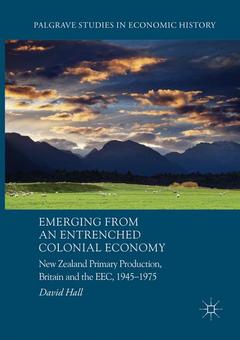Emerging from an Entrenched Colonial Economy, 1st ed. 2017 New Zealand Primary Production, Britain and the EEC, 1945 - 1975 Palgrave Studies in Economic History Series
Auteur : Hall David

This book is a study of New Zealand shaking off its quasi-colonial dependence on Britain. Has New Zealand moved beyond its colonial heritage? Is it now time to remove the Union Jack from the national flag and change to a Republic? Hall analyses the three decades after World War II when changes in Britain, mainly as a consequence of that war, forced New Zealand to seek new markets for its exports, which were predominantly primary produce; notably meat, wool and dairy products. A key symbol of these changes was Britain becoming a member of the European Economic Community (EEC) in 1973 ? how did this engagement with Europe impact on trade with a Commonwealth country? Significantly, rather than politicians and diplomats, voices of New Zealand?s primary producers (the 'backbone of the economy') are used to describe the country?s decolonisation in trade.
The volume traces how relationships between Britain and one of its main dominions evolved from their quasi-colonial relationship and how the dominion coped with breaking away from over-dependence on Britain not just in economic terms but also in sentimental terms. Hall provides an interesting overview of the final stages of decolonisation.
Provides a history of the impact on New Zealand’s primary producers of Britain’s entry into the European Common Market
Analyses New Zealand's economic and diplomatic history
Takes a primary producer perspective on changes between 1945-75 rather than a purely political economy stance
Of great interdisciplinary interest, including economics and agricultural historians, historical geographers, scholars of international trade and international relations
Date de parution : 08-2018
Ouvrage de 339 p.
14.8x21 cm
Disponible chez l'éditeur (délai d'approvisionnement : 15 jours).
Prix indicatif 126,59 €
Ajouter au panierDate de parution : 07-2017
Ouvrage de 339 p.
14.8x21 cm
Disponible chez l'éditeur (délai d'approvisionnement : 15 jours).
Prix indicatif 126,59 €
Ajouter au panierThèmes d’Emerging from an Entrenched Colonial Economy :
Mots-clés :
Domestic organisation; Marketing; Diversification; World War II; Meat industry; Dairy industry; Wool industry; WW2



